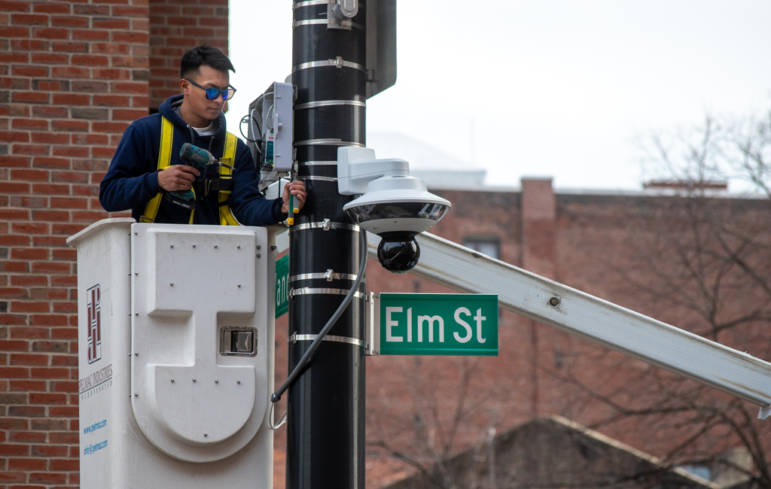

CONCORD, NH — Surveillance to identify a person in a vehicle on a roadway or walking on a sidewalk using cameras or other devices would be prohibited under a bill the Senate Judiciary Committee heard Wednesday.
House Bill 474 adds pedestrians and a person’s identity, as well as location, to a law that currently prohibits the state from using surveillance to determine a vehicle’s owner or identify passengers.
Under the law the use of cameras as well as other devices, such as a transponder, cellular telephone, global positioning satellite, or radio frequency identification device, are prohibited for surveillance on a public roadway.
The bill expands the prohibition to surveillance of individuals on sidewalks and tracking their movement under HB 474, and also on identifying an individual’s location in a vehicle.
A similar bill passed the House last session but died in the Senate due to the pandemic.
The bill was originally introduced to address a court ruling, but also in light of a constitutional amendment state voters added to the constitution in 2018 with an 81 percent majority protecting a person’s right to privacy.
“This relates to the constitutional right to privacy,” said the bill’s prime sponsor, Rep. Keith Erf, R-Weare, noting it also addresses a problem in the existing statute that does not exempt State Parks for their use of cameras in parking lots and long trails.
Former state Rep. Neal Kurk, R-Weare, who was long the legislature’s primary privacy advocate, introduced a similar bill noting it originally related to a court case where the judge ruled it is legal to take pictures for surveillance along a highway, but the pictures cannot be used to identify anyone.
“That makes taking pictures useless,” he said. “As soon as an officer watching the screen identifies someone, he violates the current law.”
He said the bill also is related to the recently passed constitutional amendment.
“Most folks in New Hampshire do not expect their state or town to be taking pictures of them as they drive on the highway or walk down the sidewalk,” Kurk said. “The original statute prevented municipalities and the state from tracking citizens as they go about their business on the state’s highways.”
But law enforcement and safety officials opposed the bill saying it would make current practices illegal.
Mark Doyle, director of emergency services at the Department of Safety, said if the law passed the agency would not be able to use the E-911 system as intended.
He said the service uses GPS or cellular signals to determine an accident’s location or where a person is located who needs emergency services.
Not being able to have the information without human intervention, will delay emergency services, he said.
“This bill would prevent the E-911 system from working as designed,” Doyle said. “If you cannot make the call yourself, it is intended to be able to access your location.”
Bedford Police Capt. Scott Plumer, speaking for his department and the New Hampshire Chiefs of Police, said the bill would impact the use of dashboard or body-worn cameras for many departments.
“We record all encounters with some exceptions and we’ve gotten positive feedback from the public,” Plumer said, noting “we use it for all the public interactions we have.”
The cameras serve as third-party observers, he noted, adding the bill would set up a conflict with the body camera statute.
He also noted the punitive sanction of the bill is a concern as a police officer could be found in violation and have to pay a considerable fine.
Under the bill a person who violates the prohibition is subject to a $1,000 fine for each occurrence plus the victim’s costs and legal fees.
Sen. Bill Gannon, R-Sandown, asked Plumer if the cameras up and down Elm Street in Manchester with police watching the screens to protect his wife as she walked at night would be illegal under the bill.
Plumer said they would.
Gannon asked Kurk if the bill applies to all surveillance cameras, and Kurk said only to government entities.
He said the bill does not make surveillance cameras illegal for individuals, corporations, or the private sector.
The bill was supported by Ross Connolly, deputy state director of Americans for Prosperity, who said “government is engaging in the warrantless surveillance of the citizens of New Hampshire.”
The constitutional protection is only the floor, he said, and the legislature should do more to protect citizens’ privacy as tracking technology advances.
As the bill says, Connolly said, “citizens have a right to live free from government intrusion.”
Gary Abbott of the Association of General Contractors of NH said members of his organization use cameras and GPS tracking all the time when they do work on the state’s highways.
He questioned if the contractors would be considered an extension of the Department of Transportation and therefore fall under the proposed law’s jurisdiction.
He said that is not clear in the bill, and he would like that issue resolved if the bill moves forward.
The highway surveillance law was originally passed after the state joined the E-ZPass system which could provide easy access to a person’s travel information.
The current law allows law enforcement to access some information, but the images may only be stored for 24 days unless they are part of an investigation or criminal proceeding, and then preserved for up to 18 months.
Some cities in the state have surveillance cameras as do park and ride facilities throughout the state. The park and ride facilities are exempt under the current law and would be under the proposed changes.
Surveillance cameras are along some state and local roadways.
The committee did not make an immediate recommendation on the bill.
Garry Rayno may be reached at garry.rayno@yahoo.com.







